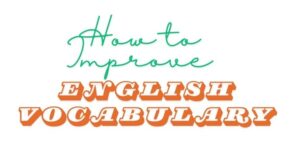Learning English vocabulary quickly is a goal for many learners, whether they are beginners or advanced students. A rich vocabulary is essential for effective communication, comprehension, and writing in English. In this comprehensive guide, we will explore practical and unique ways to learn English vocabulary fast, using proven methods and techniques.

How to Learn English Vocabulary Fast
Mastering English vocabulary can significantly enhance your ability to communicate effectively. Whether you’re preparing for exams, aiming for career advancement, or simply wanting to improve your language skills, learning new words quickly is key. This guide provides actionable strategies and tips to help you expand your vocabulary efficiently.
1. Use Flashcards and Spaced Repetition
Flashcards are a classic and effective tool for learning English vocabulary. They allow for active recall, which is the practice of actively stimulating your memory during the learning process. Spaced repetition is a learning technique that involves increasing intervals of time between subsequent reviews of previously learned material to exploit the psychological spacing effect.
- Create Your Own Flashcards: Write the English word on one side and its meaning on the other. You can also include an example sentence to see how the word is used in context.
- Use Spaced Repetition Software (SRS): Programs like Anki or Quizlet help you review flashcards at intervals designed to maximize retention.
2. Engage in Regular Reading
Reading is one of the most effective ways to learn new English vocabulary. It exposes you to new words in context, helping you understand their meanings and usage naturally.
- Read Widely: Choose a variety of materials including books, newspapers, magazines, and online articles. Fiction and non-fiction both offer valuable vocabulary.
- Use a Dictionary: When you encounter unfamiliar words, look them up. Try to understand their meanings and see how they fit into the context of the sentence.
- Keep a Vocabulary Journal: Write down new words you come across along with their definitions and example sentences. Review this journal regularly.
3. Practice Active Listening
Listening to English being spoken can help you pick up new vocabulary and understand how words are used in different contexts.
- Watch English Movies and TV Shows: Pay attention to the dialogue and take notes of any new words or phrases.
- Listen to Podcasts and Audiobooks: Choose topics that interest you to keep you engaged. Pause and rewind if you miss any words or phrases.
- Engage in Conversations: Practice speaking with native English speakers or fellow learners. This will not only improve your listening skills but also give you the confidence to use new vocabulary in conversations.
4. Use Technology and Apps
There are numerous apps and online resources designed to help you learn English vocabulary quickly and effectively.
- Vocabulary Apps: Apps like Memrise, Duolingo, and Babbel offer engaging ways to learn and review new words.
- Online Courses: Platforms like Coursera and Udemy provide structured courses that include vocabulary-building exercises.
- Language Exchange Apps: Apps like Tandem or HelloTalk connect you with native speakers for language exchange, providing real-life practice.
5. Play Word Games
Word games are a fun way to reinforce new vocabulary. They engage your brain in different ways, making learning more enjoyable.
- Crossword Puzzles: These help improve your spelling and understanding of word meanings.
- Word Search: A great way to reinforce recognition and spelling of new vocabulary.
- Scrabble or Words with Friends: These games encourage you to think about different words and how they are constructed.
6. Learn Word Families and Roots
Understanding the roots of words and their families can help you learn multiple related words at once.
- Word Families: Words that share the same root or base can help you learn more vocabulary. For example, “act” is the root for “action,” “active,” “actor,” etc.
- Prefixes and Suffixes: Learning common prefixes (e.g., “un-“, “re-“) and suffixes (e.g., “-ly”, “-ment”) can help you decipher the meanings of new words.
7. Use Mnemonics and Memory Techniques
Mnemonics are memory aids that help you remember information by associating it with something else.
- Acronyms: Create acronyms to remember groups of words. For example, HOMES for the Great Lakes (Huron, Ontario, Michigan, Erie, Superior).
- Visualization: Picture the word and its meaning in your mind. Creating a mental image can help reinforce memory.
- Association: Link new words to words you already know or to a specific image or scenario.
8. Set Specific Goals and Track Progress
Setting specific, achievable goals can help you stay motivated and focused.
- Daily Word Goals: Aim to learn a certain number of new words each day.
- Use Tracking Tools: Keep track of your progress with apps or a simple spreadsheet.
- Review Regularly: Regular review is essential for retention. Make sure to revisit words periodically.
9. Contextual Learning
Learning words in context rather than in isolation helps with retention and understanding.
- Sentence Creation: Write your own sentences using new vocabulary. This reinforces learning and helps you understand how to use the words in context.
- Thematic Learning: Group words by theme or topic. For example, learn all the vocabulary related to travel, food, or business.
10. Immerse Yourself in the Language
Immersion is one of the fastest ways to learn new English vocabulary.
- Live in an English-speaking environment: If possible, spend time in a country where English is spoken. Being surrounded by the language will accelerate your learning.
- Join English-speaking Communities: Participate in clubs, groups, or online forums where English is the primary language.
- Label Your Environment: Place labels on objects around your home or workspace with their English names. This constant exposure helps reinforce learning.
Check these for Improving Engish Speaking Skills
- 50 Idioms and Phrases for Fluent English
- How to Speak English Fluently: No Fail Tips
- 200 Daily English Sentences to Speak English Naturally
- 10 Unique Tips to Improve English Vocabulary
Practical Application of Vocabulary Learning
To make the most of these strategies, it’s essential to apply new vocabulary in practical ways.
- Write Regularly: Keep a diary or start a blog in English. Use new vocabulary in your writing to reinforce learning.
- Engage in Conversations: Regularly practice speaking with others. Join language exchange groups or find conversation partners online.
- Teach Others: Teaching new vocabulary to someone else can reinforce your own learning and understanding.
Conclusion
Learning English vocabulary fast is achievable with the right strategies and tools. By incorporating a variety of methods such as flashcards, reading, listening, and practical application, you can significantly expand your vocabulary. Remember to set specific goals, track your progress, and immerse yourself in the language as much as possible. With dedication and consistent practice, you’ll find yourself speaking and understanding English more fluently in no time.
By using these techniques, you will not only learn English vocabulary fast but also retain and use it effectively in your daily life. Keep experimenting with different methods to find what works best for you, and enjoy the journey of language learning!
